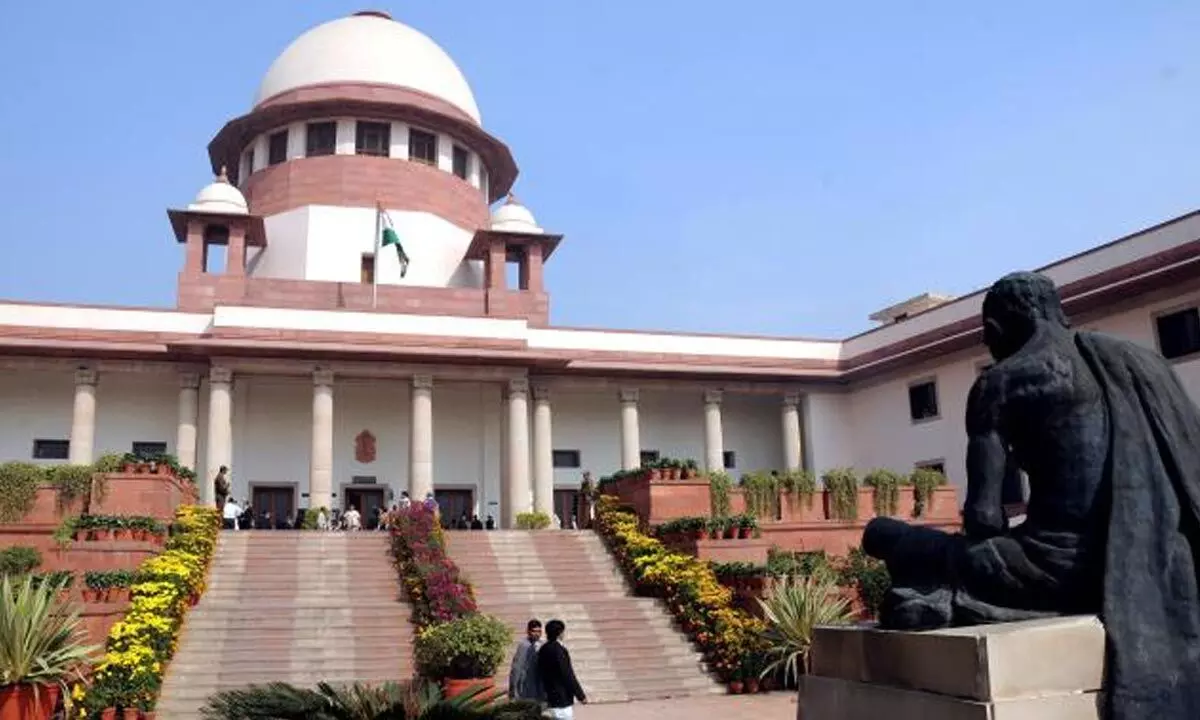Live
- Over 7,600 Syrians return from Turkiye in five days after Assad's downfall: minister
- Delhi BJP leaders stay overnight in 1,194 slum clusters
- Keerthy Suresh and Anthony Thattil Tie the Knot in a Christian Ceremony
- AAP, BJP making false promises to slum dwellers for votes: Delhi Congress
- 'Vere Level Office' Review: A Refreshing Take on Corporate Life with Humor and Heart
- Libya's oil company declares force majeure at key refinery following clashes
- Illegal Rohingyas: BJP seeks Assembly session to implement NRC in Delhi
- Philippines orders full evacuation amid possible volcanic re-eruption
- Government Prioritizes Welfare of the Poor, says Dola Sri Bala Veeranjaneyaswamy
- Two Russian oil tankers with 29 on board damaged due to bad weather
Just In
'Cry of liberty of our citizens', Supreme Court releases man sentenced to 18 years for electricity theft


Supreme Court of India
The Supreme Court on Friday said if it were not to interfere in matters of personal liberty, then "what are we here for", as it ordered the release of a man sentenced to 18 years in jail for electricity theft in nine separate cases.
New Delhi: The Supreme Court on Friday said if it were not to interfere in matters of personal liberty, then "what are we here for", as it ordered the release of a man sentenced to 18 years in jail for electricity theft in nine separate cases.
During the hearing in the matter, a bench headed by Chief Justice D.Y. Chandrachud said, "No case is too small for the Supreme Court and no case is too big because we have to answer the call of conscience and the cry of liberty of our citizens, that is why we are here...and these are not one of cases, when you sit here and burn the midnight oil, you realize that everyday there is another one like this..."
Advocate Ansar Ahmad Chaudhary, representing the petitioner Iqram, contended that the jail authorities were adamant to keep the petitioner in Jail for 18 years (in total) contrary to the judgments and orders dated November 5, 2020, passed by Additional District & Sessions Judge, Hapur in the nine cases. The trial court had directed to set off the undergone period against the period of sentence and from the judgment itself it can be inferred that the sentences shall run concurrently. He added that the intent of the legislature under Section 428 of CrPC has also not been adhered to by the jail authorities.
The top court noted that the high court should have noticed the serious miscarriage of justice and "the liberty of a citizen would be abrogated" if the petitioner is not released. The top court was informed that the petitioner has already served three years after a trial court handed him a two-year sentence in nine cases.
Iqram accepted plea bargaining and he was sentenced to two years in each of the nine cases. The authorities held that the sentences have to run consecutively, instead of concurrently, which resulted in 18 years of imprisonment.
At the outset, the bench, also comprising Justices P.S. Narasimha, said, "absolutely shocking case". Iqram moved the Supreme Court after the Allahabad High Court refused to order that his sentences should run concurrently.
The Chief Justice said, "If we don't interfere in matters of personal liberty, and we don't order the release of this person, then what are we here for..."
The bench also sought assistance of senior advocate and former Madras High Court judge S. Nagamuthu, who was present in the courtroom for another case, to resolve the matter. On the aspect of the 18-year imprisonment, Nagamuthu said this becomes a life sentence.
Releasing the petitioner, the top court, in its order, noted, "The right to personal liberty is an inalienable right. In attending to such grievances, the Supreme Court performs its duty, no more and no less..."
It further added, "If the court were not to do so, the serious miscarriage of justice of the nature, which has emerged in the present case, would be allowed to persist and the voice of the citizen whose liberty has been abrogated would receive no attention."
The petitioner was arrested in 2019 and convicted in 2020 under the Electricity Act. The plea filed by petitioner said: "The petitioner has been detained by the jail authorities and still undergoing the sentence at the wish and will of the jail authority although the trial court has granted the benefit of custody period about 21 months in each case to the petitioner while awarding sentence of two years in all...nine cases."

© 2024 Hyderabad Media House Limited/The Hans India. All rights reserved. Powered by hocalwire.com






